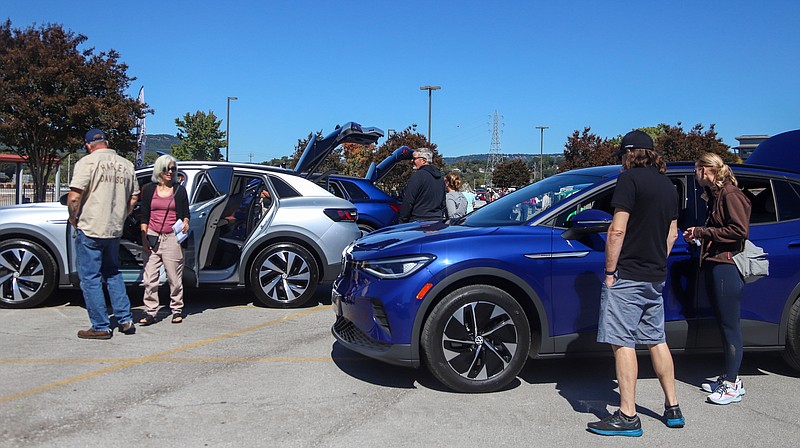Why is it so much easier in the South to bad-mouth something -- even when we know there isn't that much to complain about? Electric cars offer us a perfect example, one the Chattanooga Times Free Press examined thoroughly on Sunday.
Electric vehicles have been around Chattanooga for almost a half century -- first as an experimental car and EV track here, thanks to TVA, and then as an early electric bus manufacturer, thanks to a CARTA tourism effort promoting its all-electric and free downtown shuttle.
Chattanooga's electric car star continues to rise with Volkswagen just beginning to ship the first of its all-electric ID.4 SUVs made right here.
Other parts of Tennessee also are on the electric vehicle boat: Nissan Leafs started in the Volunteer State. And Ford F150 Lightnings are soon to join from a plant in West Tennessee. The states of Georgia and North Carolina are on board as well.
In fact, our three states lead the entire country in EV manufacturing (including battery production) and EV assembly jobs.
Jobs, we said.
Over a third of anticipated nationwide EV manufacturing jobs that were announced earlier this year, more than 40,000 of them -- more than 40,000 -- are in the Southeast, according to a new report released last month, Transportation Electrification in the Southeast.
However, as vehicles are increasingly electrified -- and even while the Southeast maps out with one of the nation's largest network of charging stations away from home -- we're not supporting our own industry success.
In the second quarter of 2022, EV sales comprised 7% of all light-duty vehicle purchases nationwide, but made up less than 4% in Tennessee -- and that was after a doubling of EV sales in our state from the year before, according to Atlas Public Policy data.
As for Chattanooga? Despite the city's roots in the growing EV market and charging stations all over the city, nearly 98% of Chattanoogans still rely on gas-powered vehicles.
Part of the problem is humankind's stubborn resistance to change -- especially alive and well in Tennessee. Another part of the problem is our backward Republican-majority state government and its backward energy policy.
For all of Tennessee's EV production and jobs, and for all of TVA's early research work, Tennessee Valley Authority and our state government are not offering the rich incentives to buy electric vehicles that exist in some states, according to Dory Larsen, the electric transportation program manager for the Southern Alliance for Clean Energy.
"With market momentum accelerating, the Southeast will see continued and increasing investments and job growth," Larsen said. But "[T]he region still lags behind national averages for EV sales, charger deployment, utility investment and public funding, with regulators, legislators, and governors reluctant to pass market-driving policies and reforms."
Did we mention that Tennessee government and TVA are developing a network of fast recharging stations, but they're doing it largely with funds from the penalties VW paid for its diesel emissions scandal a decade ago? The program, called Fast 50, will add 32 fast-charging units at 13 sites across the state. Across TVA's entire seven state region, at least 50 sites will get the new fast chargers.
Did we mention that TVA got out of the electric car research effort? Did we note that the Advanced Transportation Technology Institute that took it up (also in Chattanooga) to promote research and development of our electric shuttles was phased out? (Never mind that some of the buses still run the downtown routes 30 years after they went into service.)
And did we mention that California, another massive EV producer, recently banned the sale of new gas-powered cars after 2035, and New York's governor has directed that state's Department of Environmental Conservation to draft similar new rules?
We won't hold our breath for Tennessee's Gov. Bill Lee or Georgia's Gov. Brian Kemp to do anything like that.
Instead, give yourself a treat. Go drive an electric vehicle. You may have to seek out a Drive Electric event in another city (Chattanooga's was last Saturday) unless you can find a dealer with an unsold electric car on hand.
You'll be hard put to notice a difference between it and your gas car -- except for the splendid quiet even as you romp on the accelerator to reassure yourself that, yes, it does run just like a gas car.
You won't have time to notice the fuel cost savings unless you buy one, of course. But that savings is significant.
A study by the University of Michigan's Transportation Research Institute found that the average cost to fuel an electric car was $485 a year, compared to $1,117 for a gas-powered vehicle.
And a 2020 Consumer Reports study showed that EV drivers tend to spend about 60% less each year on fuel costs compared to drivers of gas-powered cars.
And, yeah, thanks to President Joe Biden, there will be tax credits. And soon a benefit to the earth.
Do yourself a favor and start your research soon.
